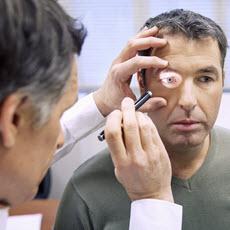
The retina is a layer of tissue in the back of your eye that senses light and sends images to your brain. It provides the sharp, central vision needed for reading, driving, and seeing fine detail. A retinal detachment lifts or pulls the retina from its normal position. It can occur at any age, but it is more common in people over age 40. It affects men more than women and whites more than African Americans. A retinal detachment is also more likely to occur in people who:
- Are extremely nearsighted
- Have had a retinal detachment in the other eye
- Have a family history of retinal detachment
- Have had cataract surgery
- Have other eye diseases or disorders
- Have had an eye injury
Symptoms include an increase in the number of floaters, which are little "cobwebs" or specks that float about in your field of vision, and/or light flashes in the eye. It may also seem like there is a "curtain" over your field of vision.
- Retinal Detachment (National Library of Medicine)... for reading, driving, and seeing fine detail. A retinal detachment lifts or pulls the retina from its normal ... women and whites more than African Americans. A retinal detachment is also more likely to occur in people ...
- Retinal detachment repair is eye surgery to place a retina back into its normal position. The retina is ... it. This article describes the repair of rhegmatogenous retinal detachments. These occur due to a hole or tear ...
- Retinal detachment is a separation of the light-sensitive membrane (retina) in the back of the eye from ... on the retina. The most common type of retinal detachment is often due to a tear or hole ...
- Retinal detachments are associated with a tear or hole in the retina through which the internal fluids of ... often caused by trauma, and the risk of retinal detachment after minor trauma, such as a blow to ...
- Retinal Detachment/Start Here ... Retinal Detachment ... National Eye Institute ... From the National Institutes of Health ... Retinal detachment is an eye problem that happens ...
- Complex Retinal Detachment (American Society of Retina Specialists)Retinal Detachment/Specifics ... Retinal Detachment ... American Society of Retina Specialists
- Retinal Detachment/Clinical Trials ... Retinal Detachment
- ... the retina from the back of the eye (retinal detachment). Affected individuals may also have abnormalities in the ... not show signs and symptoms of the condition. Retinal detachment and occipital encephalocele Genetic Testing Registry: Knobloch syndrome ...
- Detached Retina (American Academy of Ophthalmology)... back of the eye. When you have a retinal detachment, you may see flashing lights, new floaters or ...
- ... leakage of blood vessels in the retina and retinal detachment, a condition in which layers of the retina ... hyperplastic primary vitreous can cause vision loss through retinal detachment, cloudiness of the lens (cataract), or increased pressure ...



